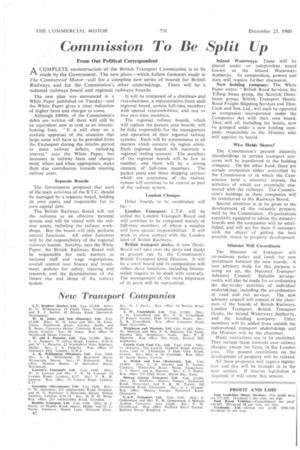Commission To Be Split Up
Page 36

If you've noticed an error in this article please click here to report it so we can fix it.
From Our Political Correspondent A COMPLETE reconstruction of the British-Transport Commission is to be 1Th made by the Government. The new plans—which follow forecasts made in The Commercial Motor—call for a complete new series of boards for British Railways and for the Commission's other undertakings. There will be a national railways board and regional railways boards.
The new plan was announced in a White Paper published on Tuesday—and the White Paper gives a clear indication of higher fares and charges to come.
Although £400m. of the Commission's debts are written off there will still be an equivalent sum to rank as an interestbearing loan. " It is still clear on a realistic appraisal of the situation that large sums will have to be provided from the Exchequer during the interim period to meet railway deficits, including interest," says the White Paper, but increases in railway fares and charges must, where and when appropriate, make their due contribution towards meeting railway costs.
Separate Boards The Government proposed that each of the main activities of the B.T.C. should be managed by a separate board, holding its own assets and responsible for its own capital debt.
The British Railways Board will run the railways as an effective national system and will be vested with the
railway assets, including the railway workshops. But the board will only perform central functions. All other functions will be the responsibility of the regional railways boards. Notably, says the White Paper, the British Railways Board will be responsible for such matters as national staff and wage negotiations, overall control over finance and investment, policies for safety, training and research, and the determination of the future size and shape of the railway system. It will be composed of a chairman and vice-chairman, a representative from each regional board, certain full-time members with special responsibilities; and one or two part-time members.
The regional railway boards, which will replace the present area boards, will be fully responsible for the management and operation of their regional railway systems. Each will be autonomous in all matters which concern its region alone. Each regional board will maintain a regional trading account. The members of the regional boards will be few in number, and there will be a strong element of full-time members. The packet ports and those shipping services which are extensions of the railway system will continue to be treated as part of the railway system.
London Changes
Other boards to be established will be:— London Transport: L.T.E. will be called the London Transport Board and will continue to be composed mainly of full-time members, of whom a number will have special responsibilities. It will work in close contact with the London lines of British Railways.
British transport docks: A new Docks Board will take over the ports and docks at present run by the Commission's British Transport Dock Division. It will be a small board and its composition will reflect those functions, including finance, which require to be dealt with centrally. The management of the more important of its ports will be represented. Inland Waterways: These will be placed under an independent board known as the Inland Waterways Authority. Its composition, powers and duty will require further discussion.
New holding company: The White Paper states: "British Road Services, the Tilling buses group, the Scottish Omnibuses group, British Transport Hotels, Road Freight Shipping Services and Thos. Cook and Son, Ltd., will each be operated as companies incorporated under the Companies Act with their own board. They will all, including the hotels, now be grouped under a new holding company, responsible to the Minister who will appoint its board.
Who Holds Shares?
The Commission's present minority shareholdings in certain transport concerns will be transferred to the holding company. On the other hand, there are certain companies either controlled by the Commission or in which the Commission hold a minority interest, the activities of which are essentially connected with the railways. The Commission's holdings in these companies will be transferred to the Railways Board.
Special attention is to be given to the development of the valuable property held by the Commission. Organizations especially equipped to advise the statutory boards and the companies will be established, and will act for them if necessary with the object of getting the best possible return in property development.
Minister Will Co-ordinate The Minister of Transport will co-ordinate policy and funds for new investment between the new boards. A new advisory body for this purpose is being set up, the National Transport Advisory Council. Suitable arrangements will also be made for co-ordinating the day-to-day activities of individual undertakings, including the co-ordination of road and rail services. The new advisory council will consist of the chairmen of the boards of British Railways, London Transport, British Transport Docks, the Inland Waterways Authority, and the holding company. Other members will be added from outside the nationalized transport undertakings and the Minister will be the chairman.
Many restrictions arc to be abolished. They include those controls over railway charges, except for fares, in the London area. The present restrictions on the development of property will be relaxed.
All these proposals will require legislation and this will be brought in in the next session. If interim legislation is required, it will come this session.




























































































